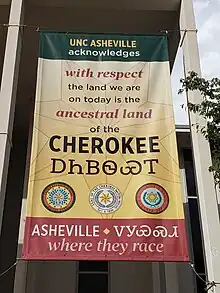Land acknowledgement
A land acknowledgement or territorial acknowledgement is a formal statement that a public event is taking place on land originally inhabited by indigenous peoples. In situations where it is used, it is often spoken at the beginning of an event. They have also become popular on social media platform biographies.

By country
Australia
In Australia, the Welcome to Country or Acknowledgement of Country is a ritual performed intended to highlight the cultural significance of the surrounding area to a particular Aboriginal Australian or Torres Strait Islander clan or language group. It has been performed since the 1970s, becoming more common since the early 2000s.[1] It is important as a refutation of the colonial idea of terra nullius, which was overturned by the Mabo decision in 1992.[2][3]
Canada
In Canada, land acknowledgments became more popular after the 2015 Truth and Reconciliation Commission report (which argued that the country's Indian residential school system had amounted to cultural genocide) and the election of Liberal prime minister Justin Trudeau that same year.[4] By 2019, they were a regular practice at events including National Hockey League games, ballet performances, and parliament meetings.[4] Most universities, and many other educational institutions, have written institutional territorial acknowledgements that are often read before events.
United States

In the United States, the practice of land acknowledgments has been gaining momentum as well.[5] The movement began with museums on the east coast and has progressively moved west over the last several years and spread to institutions of higher education, non-profit organizations, and local governments.[5] After the 2020 Oscar land acknowledgment statement by Taika Waititi,[6][7] the movement has received more attention, both positively[8] and negatively.[9] Every*Learner*Everywhere, supported by the Bill and Melinda Gates Foundation, has resources on the topic of land acknowledgment statements[10] and the Association for the Study of Higher Education has established a guide for land acknowledgments as well.[11] Albums such as Fiona Apple's Fetch the Bolt Cutters and Animal Collective's Time Skiffs have contained land acknowledgments of their recording studios in their respective liner notes.[12][13]
Criticism
Critics of land acknowledgments have described them as excesses of political correctness or expressed concerns that they amount to empty gestures that avoid addressing the issues of indigenous communities in context.[4] Ensuring the factual accuracy of acknowledgments can be difficult due to problems like conflicting land claims or unrecorded land exchanges between indigenous groups.[4]
Graeme Wood has argued that a land acknowledgement not delivered in connection with the actual return of land is nothing more than a "highwayman's receipt," "moral exhibitionism," and "a counterfeit version of respect", and that such statements should be limited to occasions "that preserve their dignity and power".[14] To argue that genuine reconciliation requires the return of stolen land, Cutcha Risling Baldy has drawn an analogy between the land acknowledgement and a thief who steals a laptop computer, refuses to give it back to the true owner, and then attaches a plaque to publicly admit his crime, so that every time he uses the laptop in public, everyone will know that it used to be the victim's computer—which is cold comfort to the victim.[15] Kevin Gover has noted how such statements can be inadvertently disempowering towards the very peoples to whom they are supposedly offered as a gesture of respect, by publicly highlighting the involuntary absence of those peoples from their traditional lands.[16] However, Baldy has also pointed out that land acknowledgements can be used in other positive ways short of accompanying the return of land, such as highlighting specific, concrete actions which the audience can take to assist indigenous peoples.[16]
References
- Bolger, Rosemary (12 November 2020). "How Welcome to Country rituals are changing to make all Australians take note". SBS News. Retrieved 10 December 2021.
- Watson, Joey (18 March 2020). "How the Acknowledgment of Country became a core national custom - and why it matters". ABC News. Australian Broadcasting Corporation. Retrieved 10 December 2021.
- "Welcome to Country". Aboriginal Victoria. Victoria Government. 27 October 2019. Retrieved 1 August 2020.
 Attribution 4.0 International (CC BY 4.0)] licence.
Attribution 4.0 International (CC BY 4.0)] licence. - Coletta, Amanda. "Canada pays tribute to indigenous people before hockey games, school days. Some complain it rings hollow". Washington Post. ISSN 0190-8286. Retrieved 2020-10-04.
- Keefe, Thomas E (May 25, 2019). "Land Acknowledgement: A Trend in Higher Education and Nonprofit Organizations". doi:10.13140/RG.2.2.33681.07521.
{{cite journal}}: Cite journal requires|journal=(help) - Zorn, Eric (2020-02-11). "Column: Taika Waititi sings a new song at the Oscars: This land was their land". Chicago Tribune.
- Srikanth, Anagha (February 10, 2020). "The Oscars acknowledged the indigenous land Hollywood sits on".
- Stewart, Mariah (December 19, 2019). "Acknowledging Native Land is a Step Against Indigenous Erasure".
- Martin, Nick (February 10, 2020). "The Dissonance of a Land Acknowledgment at the Oscars". The New Republic.
- Pelc, Corrie (December 13, 2021). "An Introduction to Indigenous Land Acknowledgements for College and University Leaders". Every Learner Everywhere.
- "Association for the Study of Higher Education". www.ashe.ws.
- "Fiona Apple Discusses New LP and Indigenous Lands in TV Interview". SPIN. 29 April 2020. Retrieved 10 May 2022.
- Axeman, Stephen. "Animal Collective: Time Skiffs (Domino) - review". Under the Radar. Retrieved 10 May 2022.
- Wood, Graeme (November 28, 2021). "'Land Acknowledgments' Are Just Moral Exhibitionism". The Atlantic. Retrieved September 10, 2023.
- Lee, Robert; Ahtone, Tristan (March 30, 2020). "Land-Grab Universities". High Country News. Archived from the original on April 19, 2020. Retrieved April 20, 2020.
- Veltman, Chloe (March 15, 2023). "So you began your event with an Indigenous land acknowledgment. Now what?". NPR. Retrieved September 10, 2023.
External links
- Native Land Digital, Territory Acknowledgement (Canada)